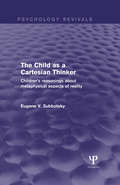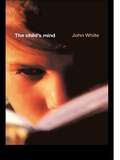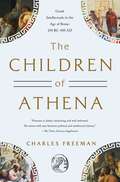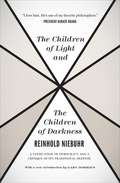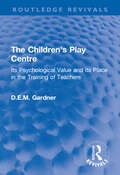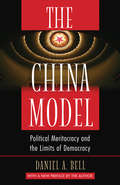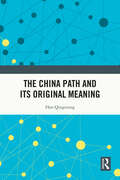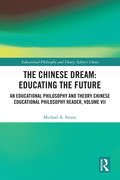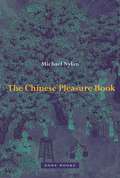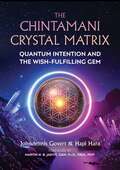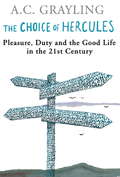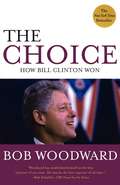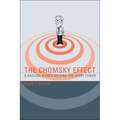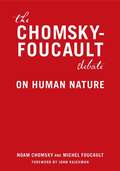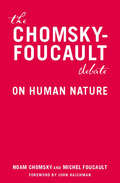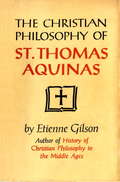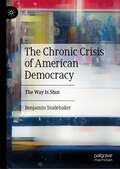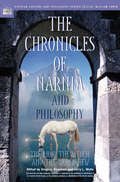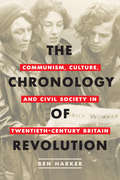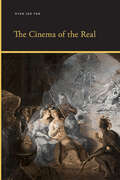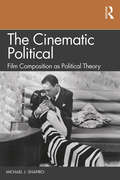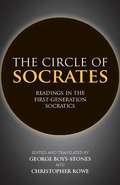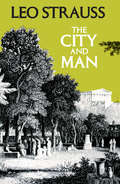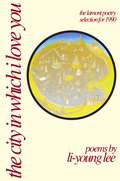- Table View
- List View
The Child as a Cartesian Thinker: Children's Reasonings about Metaphysical Aspects of Reality (Psychology Revivals)
by Eugene V. SubbotskyOriginally published in 1996, this book presents and analyses children’s reasonings about fundamental metaphysical problems. The first part describes dialogues with children that were constructed on the basis of Descartes’ Mediations on First Philosophy and which look at children’s ideas about the relationships between true and false knowledge, mental images and physical objects, mind and body, personal existence and the external world, dreams and reality, and the existence of the Supreme Being, among others. The second part of the book draws on concepts that children of various ages have about psychological and metapsychological aspects of human reality such as: cognitive and moral development; personal freedom and responsibility; the relationships between conscious and unconscious; living and non-living; and about the fundamental drives of an individual for development and expansion of his or her needs and passions, for eternal life, and for the dreamlike world of fulfilled wishes. The book presents a systematic empirical and theoretical study of the problems, some of which were touched on in Piaget’s early writing but which he later abandoned and which were only sporadically illuminated by other authors, whereas others were completely new to research in developmental psychology at the time. It will still be a helpful guide for developmental psychologists, teachers, educationalists, social workers, lawyers, and other professionals interested in the knowledge that 4- to 14-year-old children have about the most fundamental aspects of reality and human beings.
The Child's Mind
by John WhiteHow does a child's mind work? And what should parents know about it to help them in their daily interaction with children?This book is a fascinating, non-technical introduction to the mental life of the child. Written in a simple, accessible way for those without an academic background in philosophy, the book explores and explains key elements of the child's mind without overwhelming the reader with complicated theories. Some of the areas discussed are: how children learn concepts the acquisition of beliefs, skills, knowledge and understanding the place of memory can we teach thinking skills? what is intelligence? imagination and creativity the development of emotion connections between home life, education and the school curriculum.
The Childhood Of Art (European Perspectives: A Series In Social Thought And Cultural Criticism)
by Sarah KofmanThe Childhood of Art: An Interpretation of Freud's Aesthetic
The Children of Athena: Greek Intellectuals in the Age of Rome: 150 BC-400 AD
by Charles FreemanA brilliant, fascinating portrait of the intellectual tradition of Greek writers and thinkers during the Age of Rome.In 146 BC, Greece yielded to the military might of the Roman Republic; sixty years later, when Athens and other Greek city-states rebelled against Rome, the Roman general Lucius Cornelius Sulla destroyed the city of Socrates and Plato, laying waste to the famous Academy where Aristotle had studied. However, the traditions of Greek cultural life continued to flourish during the centuries of Roman rule that followed—in the lives and work of a distinguished array of philosophers, doctors, scientists, geographers, and theologians. Charles Freeman's accounts of such luminaries as the physician Galen, the geographer Ptolemy, and the philosopher Plotinus are interwoven with contextual "interludes" that showcase a sequence of unjustly neglected and richly influential lives. A cultural history on an epic scale, The Children of Athena presents the story of a rich and vibrant tradition of Greek intellectual inquiry across a period of more than five hundred years, from the second century BC to the start of the fifth century AD.
The Children of Light and the Children of Darkness: A Vindication of Democracy and a Critique of Its Traditional Defense
by Reinhold NiebuhrThe Children of Light and the Children of Darkness, first published in 1944, is considered one of the most profound and relevant works by the influential theologian Reinhold Niebuhr, and certainly the fullest statement of his political philosophy. Written and first read during the prolonged, tragic world war between totalitarian and democratic forces, Niebuhr’s book took up the timely question of how democracy as a political system could best be defended. Most proponents of democracy, Niebuhr claimed, were “children of light,” who had optimistic but naïve ideas about how society could be rid of evil and governed by enlightened reason. They needed, he believed, to absorb some of the wisdom and strength of the “children of darkness,” whose ruthless cynicism and corrupt, anti-democratic politics should otherwise be repudiated. He argued for a prudent, liberal understanding of human society that took the measure of every group’s self-interest and was chastened by a realistic understanding of the limits of power. It is in the foreword to this book that he wrote, “Man’s capacity for justice makes democracy possible; but man’s inclination to injustice makes democracy necessary.”This edition includes a new introduction by the theologian and Niebuhr scholar Gary Dorrien in which he elucidates the work’s significance and places it firmly into the arc of Niebuhr’s career.
The Children's Play Centre: Its Psychological Value and its Place in the Training of Teachers (Routledge Revivals)
by D.E.M. GardnerFirst published in 1937, The Children’s Play Centre is an account of Gardner’s Play Centre and her work in assessing its value in the education of children and the training of teachers. The book puts forward the value of play in the development of children and provides a detailed report of Gardner’s experiment. It also explores the significance of the Play Centre to the technique of training students. It will have lasting relevance for those interested in the history of education and the psychology of education.
The China Model: Political Meritocracy and the Limits of Democracy
by Daniel A. BellWesterners tend to divide the political world into "good" democracies and "bad" authoritarian regimes. But the Chinese political model does not fit neatly in either category. Over the past three decades, China has evolved a political system that can best be described as "political meritocracy." The China Model seeks to understand the ideals and the reality of this unique political system. How do the ideals of political meritocracy set the standard for evaluating political progress (and regress) in China? How can China avoid the disadvantages of political meritocracy? And how can political meritocracy best be combined with democracy? Daniel Bell answers these questions and more.Opening with a critique of "one person, one vote" as a way of choosing top leaders, Bell argues that Chinese-style political meritocracy can help to remedy the key flaws of electoral democracy. He discusses the advantages and pitfalls of political meritocracy, distinguishes between different ways of combining meritocracy and democracy, and argues that China has evolved a model of democratic meritocracy that is morally desirable and politically stable. Bell summarizes and evaluates the "China model"--meritocracy at the top, experimentation in the middle, and democracy at the bottom--and its implications for the rest of the world.A timely and original book that will stir up interest and debate, The China Model looks at a political system that not only has had a long history in China, but could prove to be the most important political development of the twenty-first century.
The China Path and its Original Meaning
by Han QingxiangThis book examines the fundamental issues of Marxism in the 21st century and explores its contributions through the explanatory framework of the unity of continuity and stages, spatial and temporal analysis, and the dialectical relationship of universality and particularity of Marxist historical development. Marxism in the 21st century is a concept closely related to the historical changes of capitalism and the historical shift of the centre of the socialist movement. Marxism in the 21st century should be developed on the basis of the continuation of the fundamental position, value orientation, ideals and beliefs, basic principles and methodological principles of Marxism. This book explores the logic of the development of modernisation in contemporary China and the world, the communication and interaction between contemporary China and the world, and the coexistence of socialism and capitalism. It also examines the relationship between the adaptation of Marxism to the Chinese context, Marxism in contemporary China and in the 21st century. The book also discusses Xi Jinping's Thought on Socialism with Chinese Characteristics for a New Era, which provides a scientific theoretical system for interpreting the contemporary world and could become the core theoretical form of Marxism in the 21st century. The book will be essential reading for students and scholars of Marxism, Chinese studies and modernisation theory.
The Chinese Dream: An Educational Philosophy and Theory Chinese Educational Philosophy Reader, Volume VII (Educational Philosophy and Theory: Editor’s Choice)
by Michael A. PetersThis edited collection is based on a series of articles written by Michael A Peters as Editor-in-Chief of Educational Philosophy and Theory to explore the concept of The Chinese Dream first introduced by President Xi in 2012. This seventh volume in the Editor's Choice series provides a philosophical and historical analysis of The Chinese Dream by analyzing its major intersecting narratives - liberal, Confucian and Marxist. With chapters covering higher education strategy, social governance, socialist rule of law, the US-China trade war, technological unemployment and the emergence of the Chinese techno-state, this volume also offers an introduction to Chinese philosophy and history, and its narrative re-crafting that presents China as a global power. The author calls this process and the emerging Chinese narratives 'Educating the Future'.
The Chinese Pleasure Book
by Michael NylanThis book takes up one of the most important themes in Chinese thought: the relation of pleasurable activities to bodily health and to the health of the body politic. Unlike Western theories of pleasure, early Chinese writings contrast pleasure not with pain but with insecurity, assuming that it is right and proper to seek and take pleasure, as well as experience short-term delight. Equally important is the belief that certain long-term relational pleasures are more easily sustained, as well as potentially more satisfying and less damaging. The pleasures that become deeper and more ingrained as the person invests time and effort to their cultivation include friendship and music, sharing with others, developing integrity and greater clarity, reading and classical learning, and going home. Each of these activities is explored through the early sources (mainly fourth century BC to the eleventh century AD), with new translations of both well-known and seldom-cited texts.
The Chintamani Crystal Matrix: Quantum Intention and the Wish-Fulfilling Gem
by Johndennis Govert Hapi Hara• Examines myths of the Chintamani from East and West, including from China, India, and South America; in legends of the Holy Grail and Atlantis; and in Nicholas Roerich&’s real-life quest for Shambhala • Explains the Chintamani Matrix--the multidimensional field of light, energy, and consciousness that forms networks of gems on the etheric and physical levels • Provides simple and advanced practices with crystal grids and meditation to help you access the Chintamani matrix and realize your innermost heart&’s desires Space, time, intention, matter, and consciousness all entangle in crystals. Nowhere is this more evident than in the ancient gem archetype of the Chintamani, the wish-fulfilling jewel known in legends around the world as the stone that grants your heart&’s desires. As authors Johndennis Govert and Hapi Hara reveal, the Chintamani&’s &“tachyolithic&” technology of wish-granting and spiritual enlightenment creates a vehicle for positive transformation. They show how the Chintamani energy matrix can be accessed using tangible crystals and gemstones, meditation, yoga, and the powerful science of intention. Exploring the many Chintamani myths and legends from East and West, the authors explain how there are three types of Chintamani: the mythical gemstone, the power crystals of history, such as the Koh-i-Noor diamond, and the multidimensional field of light, energy, and consciousness that forms a network of all gems in what is known as &“the jewel net of Indra&” in Hinduism and Buddhism. Activating this crystal energy matrix provides a way to manifest your intentions and help you create the subtle diamond body. The authors detail specific gems and crystal spiritual technology that can affect material reality and trigger profound spiritual growth. They provide a number of simple practices with crystal grids and meditation to help you access the Chintamani matrix and become aware of the interconnected jewel net of consciousness. They examine the science of intention, which provides a basis for connecting to gemstones and crystals, and share advanced meditations to realize and activate your innermost heart&’s desires.
The Choice Of Hercules: Pleasure, Duty And The Good Life In The 21st Century
by A. C. GraylingDuty or Pleasure? This was the legendary choice which faced Hercules and which pre-eminent philosopher A.C. Grayling uses as the starting point of this masterful book.He shows us how much more people can understand about themselves and their world by reflecting on today's moral challenges. Above all, he explores the idea that certain demands and certain pleasures are necessary, not just because of their intrinsic merits but because of what they do for each other. With exceptional clarity and unrivalled prose, Grayling addresses the everyday ethical choices which confront us all.
The Choice: How Bill Clinton Won
by Bob WoodwardThe Choice is Bob Woodward's classic story of the quest for power, focusing on the 1996 presidential campaign as a case study of money, public opinion polling, attack advertising, handlers, consultants, and decision making in the midst of electoral uncertainty. President Bill Clinton is examined in full in the contest with Senate Majority Leader Bob Dole, the Republican presidential nominee. The intimacy and detail of Woodward's account of the candidates and their wives show the epic human struggle in this race for the White House.
The Chomsky Effect: A Radical Works Beyond the Ivory Tower
by Robert F. Barsky"People are dangerous. If they're able to involve themselves in issues that matter, they may change the distribution of power, to the detriment of those who are rich and privileged." --Noam Chomsky. Noam Chomsky has been praised by the likes of Bono and Hugo Chavez and attacked by the likes of Tom Wolfe and Alan Dershowitz. Groundbreaking linguist and outspoken political dissenter--voted "most important public intellectual in the world today" in a 2005 magazine poll--Chomsky inspires fanatical devotion and fierce vituperation. In "The Chomsky Effect," Chomsky biographer Robert Barsky examines his subject's positions on a number of highly charged issues--Chomsky's signature issues, including Vietnam, Israel, East Timor, and his work in linguistics--that illustrate not only "the Chomsky effect" but also "the Chomsky approach." Chomsky, writes Barsky, is an inspiration and a catalyst. Not just an analyst or advocate, he encourages people to become engaged--to be "dangerous" and challenge power and privilege. The actions and reactions of Chomsky supporters and detractors and the attending contentiousness can be thought of as "the Chomsky effect." Barsky discusses Chomsky's work in such areas as language studies, media, education, law, and politics, and identifies Chomsky's intellectual and political precursors. He charts anti-Chomsky sentiments as expressed from various standpoints, including contemporary Zionism, mainstream politics, and scholarly communities. He discusses Chomsky's popular appeal--his unlikely status as a punk and rock hero (Eddie Vedder of Pearl Jam is one of many rock and roll Chomskyites)--and offers in-depth analyses of the controversies surrounding Chomsky's roles inthe "Faurisson Affair" and the "Pol Pot Affair." Finally, Barsky considers the role of the public intellectual in order to assess why Noam Chomsky has come to mean so much to so many--and what he may mean to generations to come.
The Chomsky-Foucault Debate: On Human Nature
by Noam Chomsky Michel FoucaultTwo of the twentieth century's most influential thinkers debate a perennial question. In 1971, at the height of the Vietnam War and at a time of great political and social instability, two of the world's leading intellectuals, Noam Chomsky and Michel Foucault, were invited by Dutch philosopher Fons Edlers to debate an age-old question: is there such a thing as "innate" human nature independent of our experiences and external influences? The resulting dialogue is one of the most original, provocative, and spontaneous exchanges to have occurred between contemporary philosophers, and above all serves as a concise introduction to their basic theories. What begins as a philosophical argument rooted in linguistics (Chomsky) and the theory of knowledge (Foucault), soon evolves into a broader discussion encompassing a wide range of topics, from science, history, and behaviorism to creativity, freedom, and the struggle for justice in the realm of politics. In addition to the debate itself, this volume features a newly written introduction by noted Foucault scholar John Rajchman and includes additional text by Noam Chomsky.
The Chomsky-Foucault Debate: On Human Nature
by Noam Chomsky Michel FoucaultIn this historic 1971 debate, two of the twentieth century&’s most influential thinkers discuss whether there is such a thing as innate human nature. In 1971, at the height of the Vietnam War and at a time of great political and social instability, two of the world&’s leading intellectuals, Noam Chomsky and Michel Foucault, were invited by Dutch philosopher Fons Elders to debate an age-old question: Is there such a thing as &“innate&” human nature independent of our experiences and external influences? The resulting dialogue is one of the most original, provocative, and spontaneous exchanges to have occurred between contemporary philosophers. Above all, their discussion serves as a concise introduction to their two opposing theories. What begins as a philosophical argument rooted in linguistics (Chomsky) and the theory of knowledge (Foucault), soon evolves into a broader discussion encompassing a wide range of topics, from science, history, and behaviorism to creativity, freedom, and the struggle for justice in the realm of politics. In addition to the debate itself, this volume features a newly written introduction by noted Foucault scholar John Rajchman and includes substantial additional texts by Chomsky and Foucault. &“[Chomsky is] arguably the most important intellectual alive.&” —The New York Times &“Foucault . . . leaves no reader untouched or unchanged.&” —Edward Said
The Christian Philosophy of St. Thomas Aquinas
by Etienne GilsonEtienne Gilson explains the foundations of St. Thomas Aquinas's thoughts and Christian philosophy.Gilson is also the author of History of Christian Philosophy in the Middle Ages.
The Chronic Crisis of American Democracy: The Way Is Shut
by Benjamin StudebakerThis book argues that American democracy is in crisis. The economic system is slowly subjecting Americans of nearly all income levels and backgrounds to enormous amounts of stress. The United States lacks the state capacity required to alleviate this stress, and politicians increasingly find that if they promise to solve economic problems, they are likely to disappoint voters. Instead, they encourage voters to blame each other. The crisis cannot be solved, the economy cannot be set right, and democracy cannot be saved. But American democracy cannot be killed, either. Americans can’t imagine any compelling alternative political systems. And so, American democracy continues on, in a deeply unsatisfying way. Americans invent ever-more elaborate coping mechanisms in a desperate bid to go on. But it becomes increasingly clear that the way is shut. The American political system was made by those who are dead, and the dead keep it.
The Chronicles of Narnia and Philosophy
by William Irwin Jerry L. Walls Gregory BasshamThe Chronicles of Narnia series has entertained millions of readers, both children and adults, since the appearance of the first book in 1950. Here, scholars turn the lens of philosophy on these timeless tales. Engagingly written for a lay audience, these essays consider a wealth of topics centered on the ethical, spiritual, mythic, and moral resonances in the adventures of Aslan, the Pevensie children, and the rest of the colorful cast. Do the spectacular events in Narnia give readers a simplistic view of human choice and decision making? Does Aslan offer a solution to the problem of evil? What does the character of Susan tell readers about Lewis's view of gender? How does Lewis address the Nietzschean "master morality" embraced by most of the villains of the Chronicles? With these and a wide range of other questions, this provocative book takes a fresh view of the world of Narnia and expands readers' experience of it.
The Chronology of Revolution: Communism, Culture, and Civil Society in Twentieth-Century Britain (G - Reference,information And Interdisciplinary Subjects Ser.)
by Ben HarkerBased on a decade of research in over twenty archives, The Chronology of Revolution is an accessible and richly-detailed work of historical and cultural analysis that fixes its gaze on the legacy of the Communist Party of Great Britain. Communists anticipated that the party, formed in the world's first industrialised nation, would be in the vanguard of world revolution. Instead, the party never came close to matching the political power of the British Labour Party or continental Communist Parties in France or Italy and dissolved itself in 1991. In this book, Ben Harker draws on the ideas of Antonio Gramsci to argue that the CPGB, despite having great influence over British culture, never fully appreciated the importance of civil society to its political strength. Analysing members’ efforts in fields such as science, journalism, the arts, broadcasting, and education, The Chronology of Revolution offers an alternative, radical history of Britain between 1920 and 1991 which draws out important lessons for the contemporary Left.
The Cinema of the Real (SUNY series, Insinuations: Philosophy, Psychoanalysis, Literature)
by Hyon Joo YooA significant intervention into Lacanian film studies, this book sets forth a new theory of the psychoanalytic Real in cinema. In psychoanalysis, the Real ruptures the Symbolic that organizes law, ideology, and other systems of belief, revealing fissures in this underlying order. The Cinema of the Real explores how transnational cinema and especially South Korean cinema facilitate an encounter with the Real, enabling the emergence of a new political subject. Paying close attention to form, Hyon Joo Yoo reveals the existence of an "emancipatory drive" in films by Jang Hun, Park Chan-wook, Lee Chang-dong, Jia Zhangke, Michael Haneke, Claire Denis, and Bong Joon-ho, among others. Their work in effect provides viewers with a picture of how it looks and feels to be on a trajectory in which the subject and her world can change. Far from being a passive consumer of images, Yoo's spectator enters the space of the Real. Theoretically rigorous and inventive, The Cinema of the Real offers new, transnationally attuned tools for conceptualizing the body, affect, femininity, and spectatorship, as well as fresh readings of both classic and contemporary films.
The Cinematic Political: Film Composition as Political Theory
by Michael J. ShapiroIn this book, Michael J. Shapiro stages a series of pedagogical encounters between political theory, represented as a compositional challenge, and cinematic texts, emphasizing how to achieve an effective research paper/essay by heeding the compositional strategies of films. The text’s distinctiveness is its focus on the intermediation between two textual genres. It is aimed at providing both a conceptual introduction to the politics of aesthetics and a guide to writing strategies. In its illustrations of encounters between political theory and cinema, the book’s critical edge is its emphasis on how to intervene in cinematic texts with innovative conceptual frames in ways that challenge dominant understandings of life worlds. The Cinematic Political is designed as a teaching resource that introduces students to the relationship between film form and political thinking. With diverse illustrative investigations, the book instructs students on how to watch films with an eye toward writing a research paper in which a film (or set of films) constitutes the textual vehicle for political theorizing.
The Circle of Socrates: Readings in the First-Generation Socratics
by Christopher Rowe George Boys-StonesIn addition to works by Plato and Xenophon, we know of dozens of treatises and dialogues written by followers of Socrates that are now lost. The surviving evidence for these writings constitutes an invaluable resource for our understanding of Socrates and his philosophical legacy. The Circle of Socrates presents new--sometimes the first--English translations of a representative selection of this evidence, set alongside extracts from Plato and Xenophon. The texts are arranged according to theme, with concise introductions that provide an overview of the topics and the main lines of thought within them.The aim is to give a fuller account of the philosophical activity of Socrates' immediate followers: both to shed light on less well known figures (some of whom inspired schools and movements that were influential in the development of later thought), and also to improve our grasp of the intellectual context within which Plato and Xenophon, the most important of the Socratics, lived and wrote. Included are a general introduction to the history, content, and character of these writings; a bibliography; an index of sources; and an index of the Socratics and their works.
The City and Man
by Leo StraussThe provocative essays constitute a brilliant attempt to use classical political philosophy as a means of liberating modern political philosophy from the stranglehold of ideology.
The City in Which I Love You
by Li-Young LeeContentsI.Furious VersionisII.The InterrogationThis Hour And What Is DeadArise, Go DownMy Father, In Heaven, Is Reading Out LoudFor A New Citizen Of These United StatesWith RuinsIII.This Room And Everything In ItThe City In Which I Love YouIV.The WaitingA StoryGoodnightYou Must SingHere I AmA Final ThingV.The Cleaving
